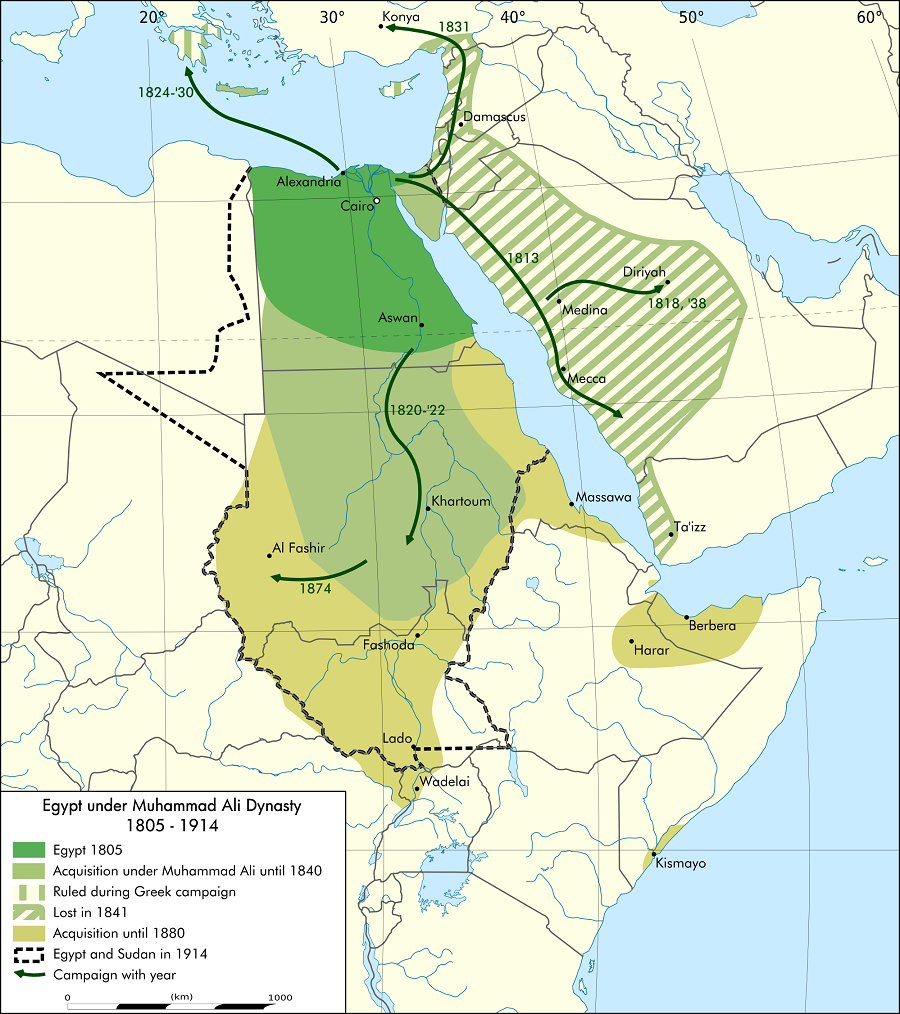Khartum was so closely invested that no certain news of what happened there could be obtained.
Continuing Great Britain Expands Control of Egypt,
our selection from History of England by James Franck Bright published in 1893. The selection is presented in seven easy 5 minute installments. For works benefiting from the latest research see the “More information” section at the bottom of these pages.
Previously in Great Britain Expands Control of Egypt.

The insurrection spread and the Mahdi’s troops captured the Egyptian garrisons one after the other. On the west Osman Digna, representing the Mahdi, besieged the fortresses of Tokar and Sinkat, and advanced almost within reach of Suakim. The relief of Tokar was entrusted to Baker Pacha, with the Egyptian Gendarmerie. Not yet formed as soldiers, they were no match for the Arabs. The square, unexpectedly attacked on its march, was immediately broken; the whole army fled, leaving two thousand two hundred on the field (February 5th). Sinkat and Tokar at once surrendered The fear lest the insurrection should reach the coast and spread into Arabia, thus disastrously affecting the Indian high-road, forced upon England the necessity of defending Suakim. Thither General Graham was dispatched, and there he succeeded in winning the Battle of El Teb over Osman Digna, and in checking the Arab advance by subsequent operations. The hand of England had been thus in some degree forced; it had been found impossible to decline all responsibility, impossible to avoid recourse to arms; and now the news that General Gordon was surrounded in Khartum roused in England an overwhelming feeling that British troops must be used in this direction also.
As early as March 23, 1884, the Mahdi’s troops had begun to fire upon the city, and General Gordon, driven to the defensive, had been giving proof of his resourceful vigor. But before long Khartum was so closely invested that no certain news of what happened there could be obtained. A universal cry arose in England for the relief of Gordon. Yet the Government continued to hesitate. Though they were fully determined to send an army of relief, there was a great division of opinion as to the most desirable route to be adopted; months were wasted in discussing the question whether Khartum should be approached by the Red Sea and Berber, or by the longer but better known route up the Nile. A vote of credit, nominally for preparations only, was demanded before the close of the session, and seemed to prove that an expedition was in contemplation. But there were still some weeks of fatal delay; it was not till September 1st that Lord Wolseley, who had been chosen to command the expedition, sailed from England. When once active operations had begun, there was no lack of energy or good management. The difficulties that of necessity occurred in moving an army in small boats up a river broken with cataracts were gradually surmounted, but it was not till December that Korti was reached. Aware of the necessity of haste, Wolseley from that point sent forward General Herbert Stewart with a detachment of about two thousand men, to avoid a great curve of the river by a direct march across the desert to Metamneh.
General Stewart, fighting successfully two sharp battles on the way, at Abu-Klea and Gubat, arrived again at the river. He had been mortally wounded in the last engagement and had given up the command to Sir Charles Wilson. Several of Gordon’s ironclad steamers were found at Metamneh, ready to receive the relieving troops. Wilson thought it necessary to make a reconnaissance below Metamneh before proceeding farther. The delay may have been necessary, but it was certainly fatal to the success of the expedition. On January 28th Wilson with a small detachment of troops steamed up to Khartum, only to find the flag of the Mahdi waving over it, the place having been occupied and General Gordon killed just two days before.
General Gordon was cast in heroic mold. His virtues, his faults, and his eccentricities were alike full of grandeur. His strange and varied career, the mastery he displayed everywhere over the half-civilized races with whom he had chiefly had to deal, the charm of his personality, the hold he acquired on the love and fidelity of his followers, had given him a unique place in the admiration of the nation. The dramatic incidents attending the tragic close of the life of such a man excited the deepest feel ing throughout the country. From all sides the most bitter reproaches were directed against the Ministers, who were held to have deserted him and by their procrastination to have caused his ruin. The fall of Khartum and the death of Gordon were in fact the death-blow of the Ministry.
Their whole conduct during the unfortunate year of 1884 was marked by irresolution and weakness. The anomalous position they had insisted on taking up produced a tissue of blunders and misunderstandings. Believing that the evacuation of the Sudan was a financial and political necessity, they yet declined responsibility in the matter, and allowed Hicks Pacha to march to his ruin and Baker Pacha, unaided, to be annihilated in his efforts to relieve Tokar. They then suddenly made use of their practical authority to insist upon the retirement from Upper Egypt. But, regardless of the immense difficulty of the operation, they sent no assistance to the Egyptian Government, but trusted entirely to the individual efforts of Gordon. Again they blundered from a want of definition of their responsibilities and duties. It was uncertain then, and is uncertain now, whether Gordon went out as representative of the English or of the Egyptian Government. It seems to have been agreed that he was to receive orders from the English Government only. And certainly the Government, through Lord Granville, had, on February 19th, publicly declared their responsibility for everything that Gordon did. Yet before he left Cairo he was suffered to accept from the Khedive the title of Governor-General of the Sudan, and appears to have been in structed not only to withdraw the garrisons, but to establish some form of independent government. It is certain that he so under stood his duties. But every suggestion that he made, every re quest that he proffered, for the purpose of carrying out what he considered the object of his mission was refused and apparently regarded as implying an excess of zeal on his part. He was not allowed to use Zebehr, the great slave-dealer, to counteract the influence of the Mahdi ; he was not allowed to obtain the assistance of Turkish troops or of the Indian troops at Wady Haifa; he was not allowed to confer personally, as he desired, with the Mahdi, or to open the road between Suakim and Berber; and, chief blunder of all, a quarrel as to the route of the relieving army was suffered to waste months of valuable time.
| <—Previous | Master List | Next—> |
More information here and here, and below.
|
We want to take this site to the next level but we need money to do that. Please contribute directly by signing up at https://www.patreon.com/history

Leave a Reply
You must be logged in to post a comment.